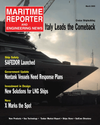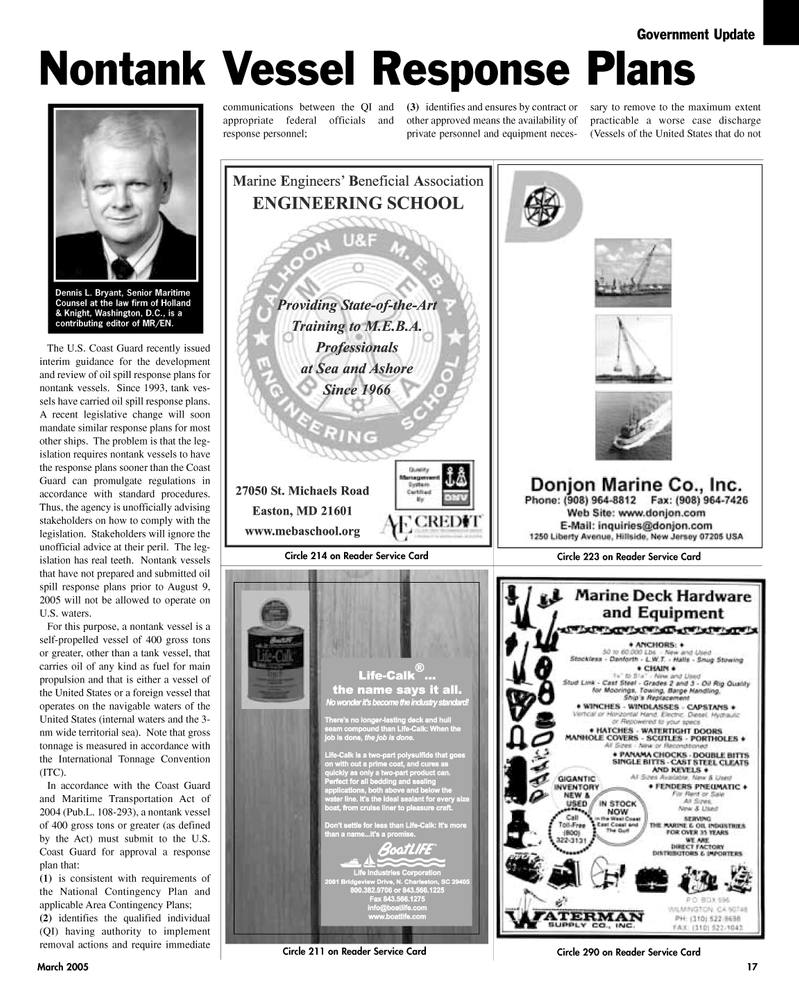
Page 17: of Maritime Reporter Magazine (March 2, 2005)
Read this page in Pdf, Flash or Html5 edition of March 2, 2005 Maritime Reporter Magazine
The U.S. Coast Guard recently issued interim guidance for the development and review of oil spill response plans for nontank vessels. Since 1993, tank ves- sels have carried oil spill response plans.
A recent legislative change will soon mandate similar response plans for most other ships. The problem is that the leg- islation requires nontank vessels to have the response plans sooner than the Coast
Guard can promulgate regulations in accordance with standard procedures.
Thus, the agency is unofficially advising stakeholders on how to comply with the legislation. Stakeholders will ignore the unofficial advice at their peril. The leg- islation has real teeth. Nontank vessels that have not prepared and submitted oil spill response plans prior to August 9, 2005 will not be allowed to operate on
U.S. waters.
For this purpose, a nontank vessel is a self-propelled vessel of 400 gross tons or greater, other than a tank vessel, that carries oil of any kind as fuel for main propulsion and that is either a vessel of the United States or a foreign vessel that operates on the navigable waters of the
United States (internal waters and the 3- nm wide territorial sea). Note that gross tonnage is measured in accordance with the International Tonnage Convention (ITC).
In accordance with the Coast Guard and Maritime Transportation Act of 2004 (Pub.L. 108-293), a nontank vessel of 400 gross tons or greater (as defined by the Act) must submit to the U.S.
Coast Guard for approval a response plan that: (1) is consistent with requirements of the National Contingency Plan and applicable Area Contingency Plans; (2) identifies the qualified individual (QI) having authority to implement removal actions and require immediate communications between the QI and appropriate federal officials and response personnel; (3) identifies and ensures by contract or other approved means the availability of private personnel and equipment neces- sary to remove to the maximum extent practicable a worse case discharge (Vessels of the United States that do not
Circle 223 on Reader Service Card
Marine Engineers’ Beneficial Association
ENGINEERING SCHOOL
Providing State-of-the-Art
Training to M.E.B.A.
Professionals at Sea and Ashore
Since 1966 27050 St. Michaels Road
Easton, MD 21601 www.mebaschool.org
Circle 214 on Reader Service Card
Government Update
Circle 211 on Reader Service Card
March 2005 17
Circle 290 on Reader Service Card
Nontank Vessel Response Plans
Dennis L. Bryant, Senior Maritime
Counsel at the law firm of Holland & Knight, Washington, D.C., is a contributing editor of MR/EN.
MR MARCH 2005 #3 (17-24).qxd 3/1/2005 12:14 PM Page 1

 16
16

 18
18
